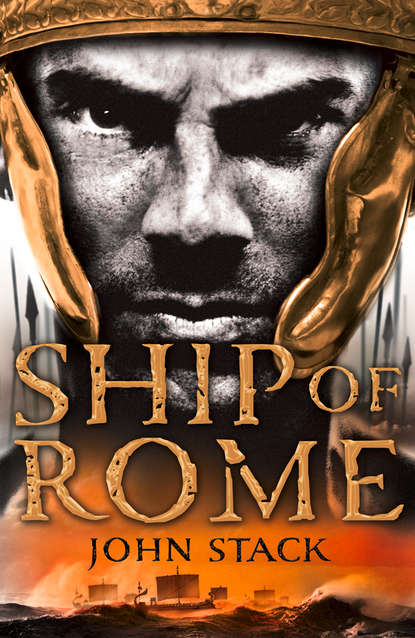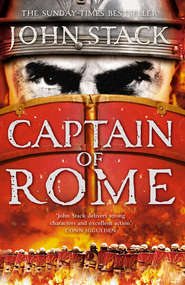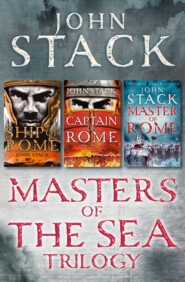По всем вопросам обращайтесь на: info@litportal.ru
(©) 2003-2024.
✖
Ship of Rome
Автор
Год написания книги
2019
Настройки чтения
Размер шрифта
Высота строк
Поля
Atticus quickly recounted the morning’s action, emphasizing the enemy’s numbers and course.
Scipio listened while the captain spoke, his expression never changing. The consul was used to hiding his thoughts and emotions from those around him, and he had trained his face to remain impassive no matter what news was delivered. This report of a fleet of Carthaginian galleys shook him to his core, however, as he realized its implications. Scipio lifted his glass to take a drink and noted with satisfaction that his hand was rock steady. He turned to his fellow Roman.
‘Centurion, do you confirm this report?’
‘Yes, Consul, every detail,’ Septimus replied without hesitation, sensing his friend Atticus bristle as his honesty was questioned. Scipio continued to hold the gaze of each man, his face a mask of indifference. Atticus immediately mistook his demeanour for a sign that he had missed the point of the report entirely.
‘Consul, the fleet was moving north through the strait. Their destination must be Thermae or Panormus further along this coast. From there they could range along the entire northern coast, attacking our transport barges as they cross from the mainland.’
Scipio had looked up the moment Atticus began to speak and he listened intently until the captain finished his sentence. It was only then that his expression changed. Not to one of understanding and concern as Atticus had expected, but to one of rage.
‘How dare you speak without permission?’ he growled at Atticus. ‘Do you think me a fool? Hold your tongue!’
Atticus was stunned by the consul’s outburst and silently cursed the manner of the man standing before him. His ship had fought hard to escape the Carthaginian fleet and for the past eight hours he had pushed the trireme to its limits. For him there was not a moment to lose and the unreadable manner of the consul irked him. The port commander at Brolium, the man he had hoped to report to, spoke to his captains as near equals, accepting their opinions and dissent in any private discussions. This man, however, this politician of Rome, kept his own counsel and invited none.
‘You men will accompany me to the legion encampment immediately,’ he said brusquely to Atticus and Septimus. ‘Wait for me in the courtyard.’
The two men saluted and turned on their heels. The consul’s personal guard quickly formed up around them and they were escorted from the rooftop.
Scipio walked to the rail and looked out over the docks below. The tempo of the labour there had not abated throughout the afternoon, but it now seemed that they had broken the back of the task of unloading the fleet of barges. With a new threat emerging in the waters beyond the harbour, Scipio wondered briefly if these would be the last supplies for the fighting legions on Sicily.
Hannibal Gisco sat in his cabin on the flagship Melqart, drinking wine from a golden goblet. The goblet had once belonged to the prefect of Agrigentum, the city Gisco had captured over a year before. Along with the entire city Council, the prefect had been stoned to death, punishment for closing the city gates against the Carthaginians’ initial advance. The man had not died well. In the corner of the cabin, reclined on a couch, Hamilcar Barca sat watching the admiral in silence. He noticed the slight smile on Gisco’s face, wondering what thought had prompted the smile, an expression so different from the frustration Gisco had displayed an hour before when he had first returned to the flagship.
Hamilcar had listened then as Gisco outlined the escape of a Roman trireme, concealing his shock at the anger that seemed to emanate from every pore of the admiral’s body. The slaves had worked with practised speed as Gisco talked, stripping the admiral of his armour and tunic, bathing his skin with scented water before massaging oil into the obviously tensed muscles of his upper body and shoulders. The familiar routine had gone some way to assuage Gisco’s frustration, but only now, as a lingering smile remained on the admiral’s face, did Hamilcar judge the moment right to discuss the implications of the Roman ship’s escape.
‘You said she was a coastal galley?’ Hamilcar asked, keeping his voice even, suppressing all elements of judgement.
‘Yes, lighter than one of our own. Probably a pirate hunter.’
Hamilcar nodded, allowing a silence to develop once more, his experience in the Council chamber of Carthage dictating his line of questioning.
‘She will flee along the northern coast of Sicily then?’
Gisco grunted a reply, disliking the young man and his presence on board the flagship. The Council’s interference in military affairs had reached new depths with the appointment of Barca, the Council’s ‘envoy’, an advisory observer who shadowed Gisco’s command.
‘No doubt to the nearest Roman port, where she will give advance warning to all that our fleet has entered these waters…’ Hamilcar persisted, trying to get Gisco to reveal his thoughts on the change in circumstances.
‘It is of little consequence, Barca, the Romans would have found out soon enough,’ Gisco replied, avoiding any admission that his failure to capture the Roman trireme was in any way significant.
A sudden knock on the door interrupted their conversation.
‘Come,’ Gisco ordered.
The commander of his personal guard, Cronus, entered. He snapped to attention.
‘Captain Maghreb of the Hermes reporting as ordered, Admiral.’
‘Good, show him in, Cronus.’
Gisco rose from his chair. He leaned over his desk, strewn with Carthaginian maps of the waters around the eastern and northern coasts of Sicily. Maghreb entered, led by the guard commander and flanked by four more soldiers. His sword and dagger had been removed. He stood to attention and saluted.
‘Reporting as ordered, Admiral,’ he said, trying to hide the tension in his voice. He failed. Gisco could sense the captain’s fear.
‘Captain,’ the admiral began, ‘I have studied all our maps and charts of these waters. I can find no reference to the whirlpool we encountered this morning. The Romans tricked us using superior local knowledge. We could not have been aware of their plans.’
Maghreb visibly relaxed and, although he still stood to attention, Gisco noticed that the tension had gone out of his shoulders and he was no longer holding his breath.
‘They will not escape the next time they cross our path,’ Maghreb added, sensing the admiral’s mood.
‘No, Captain, they will not,’ Gisco replied, his voice cold.
The two men stood facing each other in silence and Maghreb felt uncomfortable once more under Gisco’s gaze. The admiral’s expression was impossible to read, but the captain sensed that he would evade blame for the escape of the Roman galley.
He was wrong.
‘Guard commander!’ Gisco suddenly ordered, breaking the heavy silence. ‘This man disobeyed my orders, he must be punished. Seize him.’
Cronus looked at two of the guards and jerked his head towards the captain. They immediately rushed forward and grabbed his arms. Maghreb’s initial shock at the admiral’s words gave way to fear and he struggled against the men holding him.
‘But…’ he pleaded, fear consuming him, his mind unable to comprehend the admiral’s actions, ‘you said yourself, I couldn’t have known of the Romans’ trap. We were taken by surprise. We—’
‘Enough!’ Gisco bellowed, cutting across the captain’s pleas. ‘You were ordered to continue your pursuit of the Roman vessel. You did not and they escaped. There are no excuses.’
‘But…’ Maghreb began again, hopelessness overwhelming him.
‘Take him away, Commander,’ Gisco ordered. ‘Have him straddle the ram.’
The pronounced sentence instantly silenced Maghreb, an overwhelming wave of terror engulfing him. Cronus saluted and led the condemned man from the cabin.
Hamilcar had watched the entire exchange with disbelief. In the two months since being appointed to shadow Gisco, he had become increasingly aware of the man’s serpentine nature. Hamilcar had witnessed scenes like this before and as always his honour was offended by Gisco’s methods. The admiral always lulled an enemy before striking and Hamilcar knew it served no purpose other than to satisfy Gisco’s ego.
The admiral noticed Hamilcar’s expression as he sat back down behind his desk. The captain’s renewed cries for mercy could be heard through the cabin door as he was dragged up onto the deck above and brought forward to meet his fate.
‘You disapprove, Barca?’
Hamilcar kept his peace, sensing Gisco’s dislike for his position, knowing the admiral wanted to provoke a confrontation to justify his actions.
‘Let me tell you something, young man,’ Gisco began, his voice patronizing. ‘Fear is what drives men. Fear of failure. Fear of retribution. Fear of—’
‘Hannibal Gisco?’ Hamilcar interrupted, his own censure evident in every word.
‘Yes,’ Gisco replied, as if trying to explain his reasoning to an obtuse child, ‘fear of Hannibal Gisco. Maghreb was ordered to hunt down the Roman galley and he failed. Now he will pay for that failure with his life.’
Hamilcar bit back his retort, knowing the futility of arguing against a man such as Gisco. The man had no honour, no sense of the true motivation of men, the drive that inspires them to create and control an empire. He got up slowly from the couch, sensing the admiral’s dismissive gaze as he moved towards the door. He walked out without a word, glad to be out of Gisco’s company.
Hamilcar reached the deck as Cronus and two others were climbing back over the forerail. Hamilcar walked down the length of the galley, ignoring the guard commander as they passed each other amidships. By the time he reached the foredeck, Cronus had issued the order for the Melqart to get back under way. Hamilcar looked over the forerail to the figure of Maghreb below. He was tied in a supine position, face up, over the six-foot ram of the galley. With the ship at rest, half of his body was submerged under the water; however, as the quinquereme picked up speed to reach standard, the waves began to crash over him. Maghreb would drown slowly. Very slowly.
Hamilcar watched in dread fascination as Maghreb tried to draw breath between waves. An errant crest filled his mouth with water and he coughed and spluttered to clear his tortured lungs. He gained a moment’s respite but within a minute he was caught again. Maghreb threw his face up and Hamilcar was given a vision of pure terror. A cry of anguish was cut short by the cold sea, her unending current oblivious to the fate of the terrified captain. Maghreb cleared his throat again but all the while his lungs continued to fill with water.









